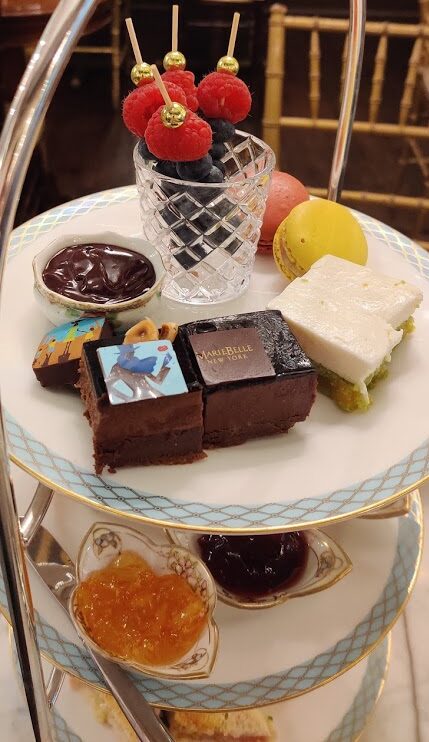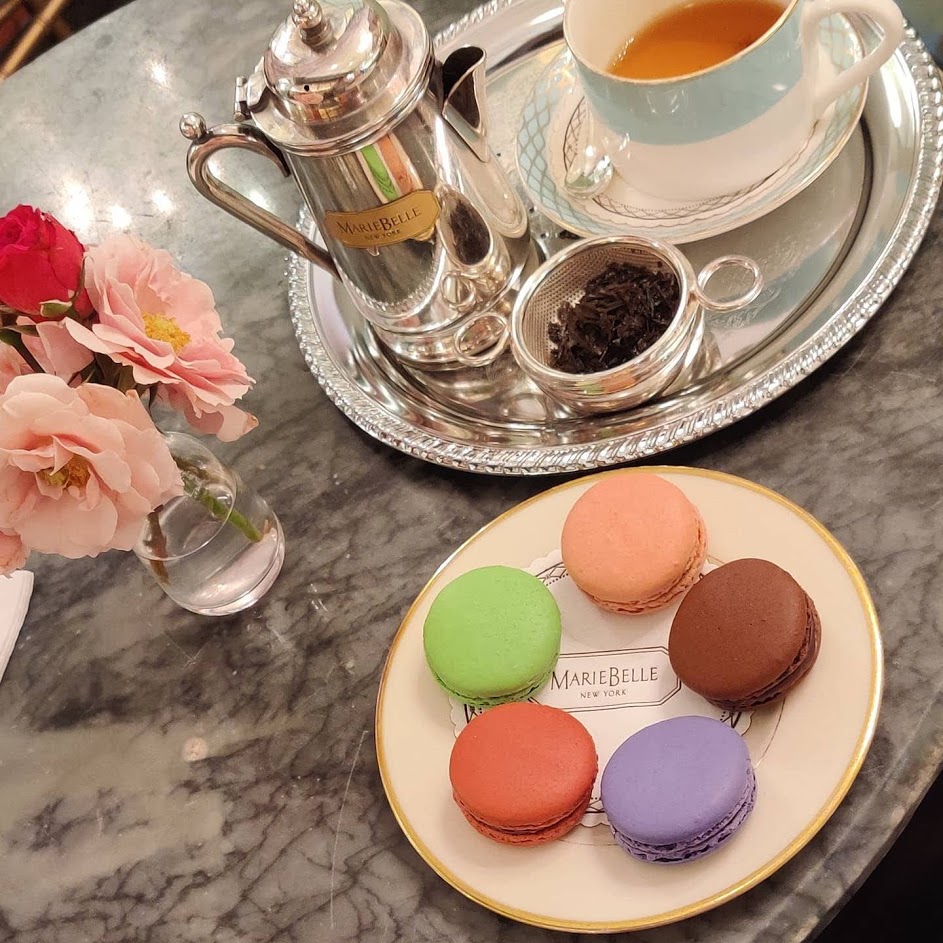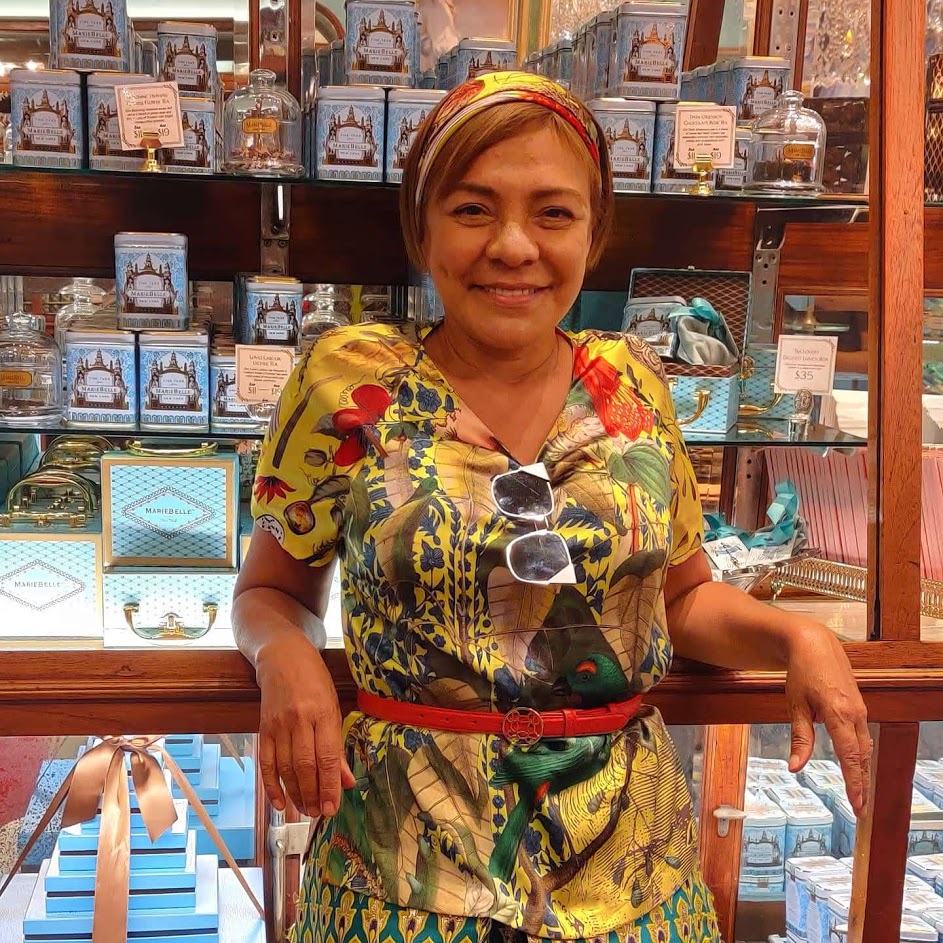Maribel Lieberman’s chocolate shop, Mariebelle, is filled with many amazing treats, teas, and, of course, chocolate.
The majority of the recipes are her own designs – from passionfruit macarons to guava teas to spicy chocolate. She has another shop located in the Kitano hotel in midtown and five shops in Japan. Maribel opened up her own shop because she wanted others to have a little taste of the foods and cultures she’s experienced around the world – Japan, France, and Honduras, her home country.

Chocolates, scones, and sandwiches
Like most businesses, Mariebelle’s was also impacted by Covid-19, with the shop closing from March to September last year. When they opened back up last October, Maribel Lieberman herself came in to redecorate the interior in order to give the shop a bit of a “refresh” because having to close her business was obviously upsetting. Maribel wanted to give the shop and her guests a refreshed feeling. Her Parisian-style shop is beautifully decorated, and the presentation of the food is colorful and sophisticated, just like the lady herself! The high tea service is incredibly good, and tastes amazing – the sandwiches, the chocolate ganache, the macarons; it’s all worth having.
Check out our interview below with the CEO and founder of Mariebelle, Maribel Lieberman!
The Knockturnal: What was your motivation/inspiration to open up not only this spot, but the Kitano location as well?
Maribel Lieberman: So, I live in this neighborhood, and I’ve been here for nearly 30 years and my husband is an artist, and so I was exposed to a lot of art – I’m also a designer. So I opened here because it’s closer to home. At that time 20 years ago, there wasn’t any chocolate stores in downtown and initially, I didn’t want to do my own brand. I wanted to open a chocolate store and I called different chocolate companies, and of course, they snubbed me, saying ‘who even are you?’ So that was the motivation to start my own brand. So, I started making my chocolates in the south of France. I could have started making my chocolates in Belgium, but I didn’t. I did a tour of some of the countries in Europe to see their chocolates – Spain, France, then to Switzerland; in Belgium and Switzerland they’re mostly known for milk chocolate. Spain, Italy, and France are dark chocolate. But I like the aesthetics of their designs. France is more artisanal, and Italy has the molded kinds, so I took inspiration from when I was in France.
The Knockturnal: How often are you able to cook the desserts yourself?
Maribel Lieberman: I don’t cook too often, but the majority of the recipes are mine – a chef might come up with something and I either approve or disapprove of it. When I come up with an idea, I may not do it myself, but I’ll work with the chef and then we go from there. I’m very much involved in designing all the packages, too. One thing that that that is very important for me is to not put preservatives in – it has to be very natural. I always have to see the labels of products or ingredients because sometimes the product may say it’s natural, but when you see the ingredients it’s not. My experience in Japan was amazing because the aesthetics are above and beyond and that has helped me to carry on here, and with opening five stores there. When I design something like I’m always thinking of the competition in Japan as well, so it puts me in another level.

A selection of macarons and lychee tea
The Knockturnal: So, what do you think has been the most difficult thing about opening up the shop here and then what do you think has been the most rewarding thing?
Maribel Lieberman: The beginning was very difficult because you don’t have a budget – you honestly don’t even know what a budget is ww=hen starting – and the rents are high. But I feel that everything is possible if you have the motivation. You’re always going to find the way. When you have something good there’s also people that want to do the same thing, so you get competition, and if you get upset that’s tough for you because you need to see the competition to keep on creating, and there’s always going to be competition. I think the most rewarding thing is when I see people really enjoying eating the products. It’s like you forget about how much work it took.
The Knockturnal: You said that fusion food is what inspired you to open up this kind of shop – is there someone who introduced you to the idea?
Maribel Lieberman: So, I became a chef – self-trained – by watching the Food Network. The cultures of New York really inspired me at the start. So, I became a chef, mixing ingredients from one region to another region – it’s like you get to introduce those flavors to people who never would have dreamed of them. Let’s say you have a hot dog – people are used to eating a hot dog with mustard or ketchup on it, but if you put another ingredient – let’s say wasabi – on the bread, it’s hot and it’s another flavor, and people ask, ‘what is wasabi?’ and be interested in knowing more. But if you were to introduce it by itself, people won’t be curious. I believe food fusion is a way for cultures to get to know each other. So, when I opened my chocolate company, I traveled, and I saw the more common flavors and I didn’t grow up with those flavors. They didn’t have any tropical flavors – I’m the one that put spices in and on the chocolate. The passionfruit, pineapple, all those flavors, paired with chocolate didn’t exist 21 years ago. I believe that being genuine to yourself and what you like because I have to like what I eat and what I make. When I became a chef, I became aware of many ingredients like cardamom and saffron and I said why not introduce it in the chocolate? And people ask, ‘what is saffron?’ and then you start explaining, and when people hear stories, they appreciate it more.
The Knockturnal: That ties into my last question – what do you want people to feel when eating your chocolates?
Maribel Lieberman: I want people to feel at home. Let’s say someone walks in here and they find a chocolate that reminds them of home and that touches their heart. I want everybody to feel welcome with my products. For example, that chocolate drink you’re having and enjoying, the recipe isn’t made with cocoa powder, it’s melted chocolate. Another thing that was important for me when I introduced my hot chocolate, I didn’t want hot cocoa, I wanted hot chocolate, so I melted the chocolate then I mixed it with water because the milk interferes with the flavor, and I became famous because of that. It’s following your heart and what you like and giving the credit to every ingredient.

Maribel Lieberman

